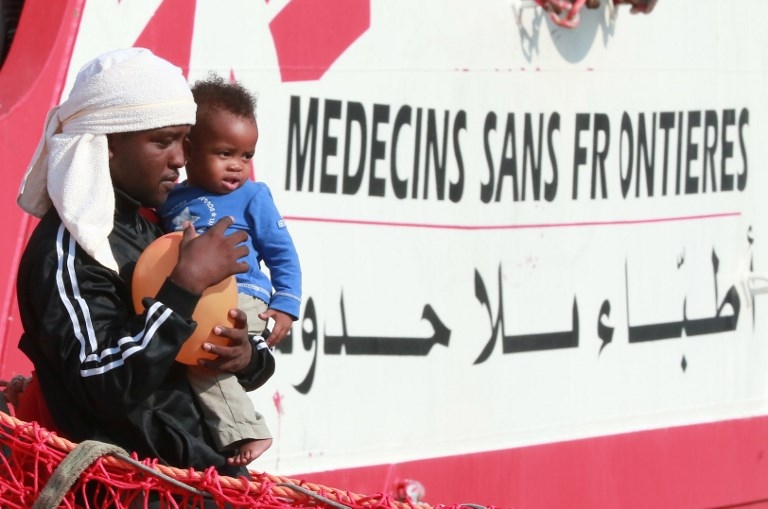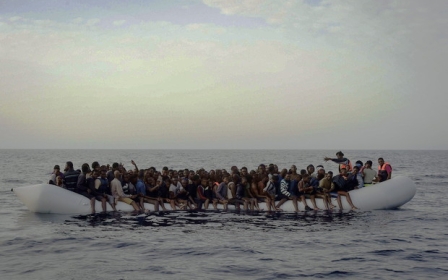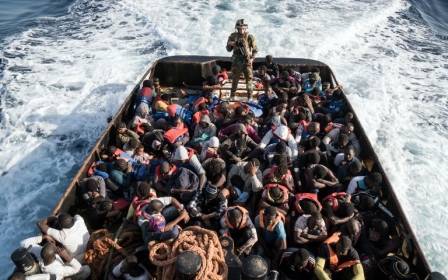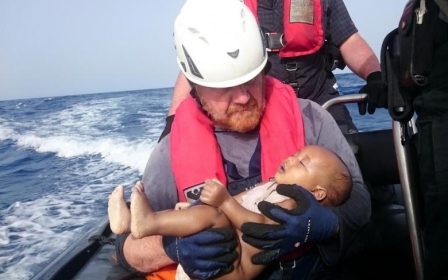Doctors Without Borders suspends migrant rescues in Mediterranean

Doctors Without Borders (MSF) said on Saturday it was suspending its migrant rescues in the Mediterranean because it felt threatened by the Libyan coastguard and that the Italian government's policies have made its job harder.
The aid group's decision is the latest development in mounting tensions between Rome and NGOs as migration dominates Italy's political agenda ahead of elections early next year.
"We are suspending our activities because now we feel that the threatening behaviour by the Libyan coastguard is very serious ... we cannot put our colleagues in danger," the president of MSF's Italian arm, Loris De Filippi, told Reuters.
Almost 600,000 migrants have arrived in Italy over the past four years, the vast majority setting sail from lawless Libya in flimsy vessels operated by people smugglers. More than 13,000 migrants have died trying to make the crossing.
The role of charity boats
Charity boats have played a growing role in rescues, picking up more than a third of all migrants brought ashore so far this year against less than one percent in 2014.
However, Italy fears the groups are facilitating people smuggling and encouraging migrants to make the passage, and it has proposed a Code of Conduct governing how they operate.
Some groups, including MSF, have refused to sign the code.
They object to a requirement that Italian police officers be on their boats and that the boats must take migrants to a safe port themselves, rather than transferring them to other vessels to allow smaller boats to stay in the area for further rescues.
MSF operates one rescue ship in the Mediterranean, the Vox Prudence, at present docked in the Sicilian port of Catania.
In the past six weeks the number of migrant arrivals in Italy has slowed sharply, and Rome has begun collaborating more closely with the Libyan coastguard, which De Filippi said was threatening the NGOs and preventing them from working.
He said the Libyan coastguard had demanded the NGOs should leave an area of hundreds of kilometres around its coast, whereas previously they had been allowed to conduct search and rescue operations as close as 11 nautical miles to the mainland.
"Last year the coastguard fired 13 shots on our boat and that was in a situation that was much calmer than the present one," said De Filippi.
He said MSF would continue its collaboration with another aid group, SOS Mediterranee, which operates a rescue ship in the Mediterranean with MSF doctors on board.
De Filippi said the Rome government's Code of Conduct for NGOs and its support for the Libyan coastguard showed it was now mixing the humanitarian goal of saving lives with "a political and military intention" of reducing arrivals.
An Italian government spokesman was not immediately available to comment.
On Friday the Italian government hailed a more than 50 per cent drop in the number of migrants from Libya reaching its coastline in July compared with the same month last year. The number of migrants reaching the country fell to 11,459 in July from 23,524 in June and 23,522 in July last year.
Fall in migrant numbers?
The fall in numbers making the crossing is likely to be the result of the more aggressive turnaround policy by the Libyan navy and coastguard. Last week Italy began a naval mission in Libyan waters to train and support its coastguard, despite opposition from factions in eastern Libya that oppose the UN-backed government based in Tripoli. Other EU nations are also providing support and training.
General Khalifa Haftar, a commander aligned with an Eastern-based parliament, told Italian daily Corriere della Sera on Saturday the presence of Italian military vessels in Libyan waters was unacceptable but he would not attack them.
The move by MSF comes as an NGO vessel that has saved the lives of hundreds of migrants in the Mediterranean moved to the rescue of a group of far-right anti-immigration activists whose ship is in difficulties off the coast of Libya.
On Friday night, German NGO Sea Eye said one of its search and rescue boats was on its way to the C-Star, manned by members of the extremist Generation Identity group, which sent a distress signal after an engine failure left it unable to manoeuvre.
New MEE newsletter: Jerusalem Dispatch
Sign up to get the latest insights and analysis on Israel-Palestine, alongside Turkey Unpacked and other MEE newsletters
Middle East Eye delivers independent and unrivalled coverage and analysis of the Middle East, North Africa and beyond. To learn more about republishing this content and the associated fees, please fill out this form. More about MEE can be found here.




